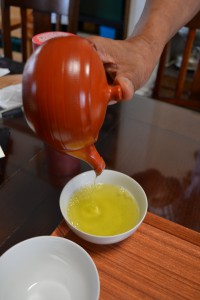The University of Shizuoka, a major beverage firm ITO EN and a social welfare service corporation Hakujujikai have confirmed through a research that taking green tea powder every day would help improve cognitive functioning of patients of dementia. They say the components of green tea, such as catechins – the antioxidant – and theanine which gives a full-bodied flavor, may be working effectively on the brain.
The three institutions jointly conducted the research from July to September last year on 12 men and women, out of which 8 are patients with vascular dementia, 3 with Alzheimer’s disease and 1 with dementia with Lewy bodies. They ground green tea leaves sold in stores into powder, and gave 2 grams of it a day in 3 divided doses at mealtime, by mixing it in drinks and jelly-type food.
After the 3-month period, the patients went through the Mini Mental State Examination, a commonly used test to assess cognitive functions such as a person’s memory. Out of the maximum score of 30 points, the average score before the research was 15.3 points, but it rose to 17 points after taking green tea powder for 3 months. The scores improved especially for items concerning short-term memory. Since the decline of short-term memory is a common initial symptom of dementia, the research indicated the possibility that taking green tea powder could delay the progress of the disease.
Hiroshi Yamada, professor of the University of Shizuoka, said that he believes catechins in green tea activate the neuronal cells in the brain and theanine protects the cells. The amount of catechins and theanine contained in 2 grams of green tea powder are equivalent to taking 2 or 3 cups of green tea brewed with a teapot in a day, according to Yamada.
(July 13, 2013)


